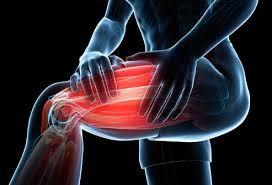
3 minute read
Leading Causes Of Muscle Twitches And Spasms
L I V I N G A H E A L T H Y L I F E S T Y L E W E E K L Y R E P O R T
I S S U E N O V E M B E R 1 2 0 1 9
Advertisement

Stay Healthy Magazine Weekly Report
Contact US: 888 737 4044
L E A D I N G C A U S E S O F M U S C L E T W I T C H E S A N D S P A S M S

Muscle twitches and spasms affect many individuals. The positive about this, of course, is that most muscle twitches are common and normal. However, some muscle twitches and spasms are signs of a serious disorder or emergency medical condition. A wide variety of conditions can be causing an eyelid that will not stop twitching or a calf muscle that aches so badly. There are certain individuals who experience intense foot cramping that feels as if their bones will break. Whether twitches and spasms are being caused by something as innocuous as stress or something more neurological, there is hope for treatment.
Stress and anxiety are a common cause of muscle spasms and twitching. Simply put, stress often leads to muscle tension, which puts a strain on the muscles and causes them to spasm. These twitches may be daily or only on certain stressful occasions. A great way to combat stress is to practice meditation and be mindful of the tension in one’s
body. It is easy to tense up the muscles without realizing it, including facial muscles and shoulders. Anxiety also leads to extra electrical impulses in the brain, which sends it down to the nerves and causes shaking and twitches. The good news is that this is one of the most common causes of this condition; many suffer from it and it can be easily treated with therapy, medications, meditation, and muscle-relaxant techniques. Caffeine Caffeine is a famous cause of muscle conditions. Caffeine is a stimulant, not just a byproduct of many individual’s favorite drinks and food, and can cause side effects. It is, of course, in coffee and tea but also in chocolate, energy drinks, soft drinks, and some medications. The side effects of caffeine iclude muscle spasms, twitching, nervousness, headaches, abnormal heartbeat, and restlessness. It also has diuretic symptoms, which means it leads to frequent urination. Caffeine can also cause eye twitches. So how much is too much caffeine? Generally, the maximum amounts are four hundred milligrams per day for a healthy adult, two hundred milligrams for pregnant women, and one hundred milligrams for adolescents. A twelve-ounce serving of coffee has 260 milligrams and twelve ounces of soda have thirty to seventy milligrams. It is recommended for an individual to wean off of caffeine slowly, however, as quitting cold turkey can cause drowsiness, headaches, and nausea. Low Potassium Low potassium is also known as hypokalemia. Potassium is a mineral the body needs to work properly. It helps the muscles to move, gives cells nutrients, and aids nerves in sending signals. Potassium also protects blood pressure from rising too much. Muscle cramping is just one symptom of hypokalemia; others include weakness, fatigue, and heart arrhythmias. Severe cases of low potassium can lead to paralysis and death. This is caused by a wide variety of conditions such as vomiting, sweating too much, consuming too much alcohol, certain medications, folic acid deficiency, diabetic ketoacidosis, poor kidney or adrenal gland function, and conditions such as Cushing’s syndrome. Restless Leg Syndrome Restless leg syndrome is a disorder of the nervous system that causes a severe urge to move the legs. It usually prevents proper sleeping so it is also considered to be a sleeping disorder. This condition can range from mild to intolerable, and symptoms include a strange itching or tingling or crawling sensations inside the legs and perhaps also in the arms. Those with restless leg syndrome feel restlessness and a strong urge to move the limbs to get rid of these sensations. They may also pace on the floor, rub the legs, or toss and turn in bed. Symptoms can come and go but are generally worse in the evenings and at nighttime. Multiple sclerosis is a serious neurological disease. It is essentially a disorder of the central nervous system in which the flow of information within the brain and between the brain and body is disrupted. Due to this, the symptoms list is extremely lengthy. Symptoms differ from patient to patient and along the course of the disease. Continue reading by subscribing today for a healthier tomorrow!


